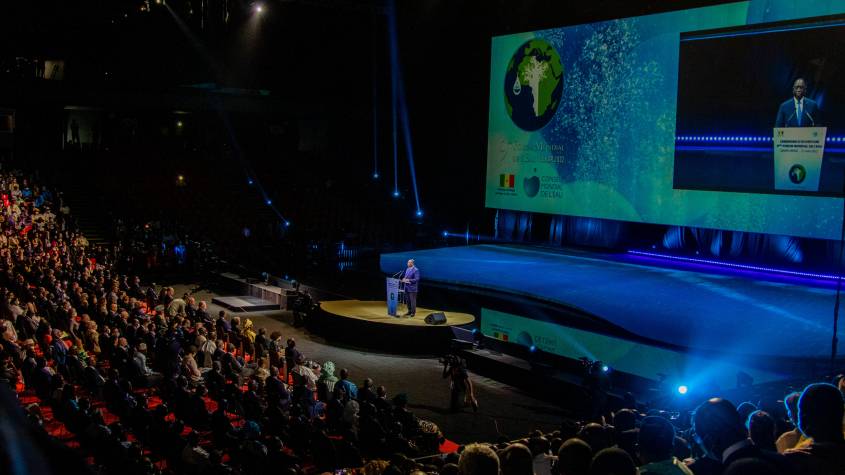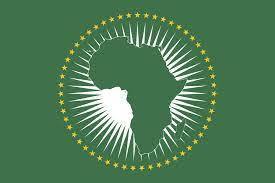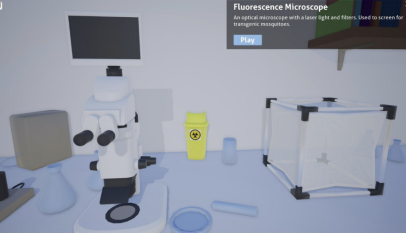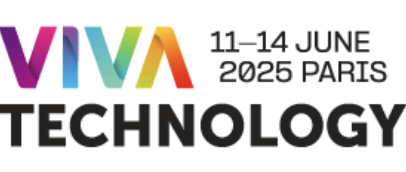How sanitation took center-stage at 9th World Water Forum in Senegal
Despite its impact on people’s health and economic wellbeing, sanitation often comes at the tail end of discussions on Water, Sanitation and Hygiene (WASH).
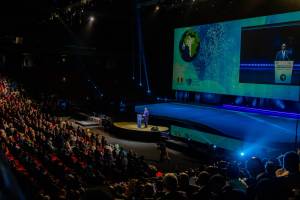
In Senegal’s new, lake-side city of Diamniadio, 40 kilometers outside of Dakar, global water and sanitation stakeholders were gathered at the 15,000-seater Dakar Arena for the opening of the 9th edition of the World Water Forum (WWF9). The triennial Forum, world’s largest water event, was being hosted for the first time in Africa South of the Sahara by the World Water Council (WWC).
Themed: “Water Security for Peace and Development,” the Forum pushed for a lasting solution to the world’s pressing Water, Sanitation and Hygiene (WASH) challenges through equitable and inclusive policies as spelled out in the Sustainable Development Goals (SDGs). It was attended by over 9,000 delegates from the government, the private sector, civil society and academia.
In physical attendance were President Macky Sall of Senegal, cum chairperson of the African Union, and his counterparts, Mohamed Ould Ghazouani (Mauritania); Denis Sassou Nguesso (Congo-Brazzaville); Sahle-Work Zewde (Ethiopia); as well as Umaro Sissoco Embalo (Guinea-Bissau). Also in attendance were World Bank President David Malpass; WWC President Loic Fauchon and UNESCO DG Audrey Azoulay.
While welcoming delegates, President Sall said WWF9 was an opportunity to “sound the alarm on the seriousness of the situation so that water-related issues remain at the heart of the international agenda. The lives and health of billions of people around the world are at stake. But also, the preservation of international peace and security.”
Senegal’s President warned about the United Nations 2021 World Water Development Report’s grim statistics: “Women and girls spend more than 200 million hours a day fetching water. 200 million people are forced to consume polluted water and 80% of [polluted] water is discharged into the environment without any treatment – putting the health and lives of 4.5 billion people at risk.”
Yet, WWC President Fauchon believes Africa’s challenge was not lack of water, rather lack of access to the precious resource which he described as “unacceptable” and a “situation of emergency”. Faunchon said the continent’s rapidly expanding population made legislation guaranteeing people’s right of access to a daily minimum allocation of water a necessity.
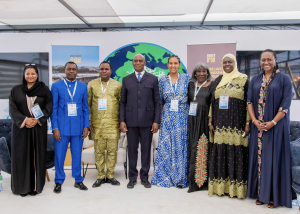
Making sanitation a priority
Beyond lamentations about global water challenges, WWF9, which was dubbed: “The Forum of Responses,” was also a platform for Africa to present its solutions and responses to the continent’s WASH problems. For the first time, the Forum considered sanitation a priority. Accordingly, a ‘Sanitation Village’ which aims to inspire concrete responses towards accelerating universal access to safe sanitation was launched.
Jolly Ann Maulit, UNICEF’s WASH specialist for West and Central Africa region, said about 120 million people in the region practiced Open Defecation (OD) as only 27% of its population had access to safely managed sanitation services. “This is a big challenge to surmount. We need to end Open Defecation to achieve the SDGs, and this requires higher-levels of financial investment, technology, and prioritization for the sanitation sector.”
According to the World Bank, over 2 billion people lack access to basic sanitation globally, one-third of which live in sub-Saharan Africa, where more than 200 million people still practice OD, resulting in not only grave public health implications but also economic consequences. Maulit says poor sanitation leads to the contamination of drinking water and the emergence of endemic diseases such as malaria and diarrhea, which kill millions of Africa’s under-five children yearly.
Poor sanitation costs Nigeria (home to Africa’s biggest population of people without access to toilets) US$3 billion each year, just as it costs Ghana and Burkina Faso US$209 million and US$171 million, respectively. Unlike water challenges and despite its obvious implications for people’s economic and health wellbeing , poor sanitation often comes at the tail end of discussions on WASH matters, hence the prevailing inadequate investment in sanitation.
“There is underinvestment in sanitation, in comparison to water, it has been given less priority overall,” said Joanne Kiarie, director of policy and government affairs at Sanergy, a Nairobi-based firm providing safe sanitation solutions for Africa’s growing cities. “We can get water right but if we don’t manage sanitation safely, the water will be contaminated,” Kiarie told African Newspage.
Osward Chanda, director for water development and sanitation at the African Development Bank (AfDB) concurs. Chanda believes even as water issues require great attention, sanitation requires even greater attention. “Sanitation is the silent killer of our economies. Between 1% and 5% of GDP is lost to lack of sanitation services. We think of supplying water to households as an end, but that must never be viewed as an end – we must safely manage sanitation.”
Brian Arbogast, director of the Gates Foundation’s WASH programme, said recent research had revealed that every US$1 invested in WASH generate up to a US$21 return, just as providing safe toilets at homes generates up to $86bn in wealth a year. He ticked off some benefits of investing in universal access to WASH services: empowerment of women and girls, poverty reduction, and massive economic gains for countries.
Chanda believes increased investment in financial resources and prioritization of sanitation by African governments and partners would ensure the delivery of safe sanitation services to the continent’s population. “In the past few years, we’ve seen progress on WASH by governments, yet there’s need for more support and advocacy to make sanitation a key priority. I’m excited to see the 9th World Water Forum leading the way.”
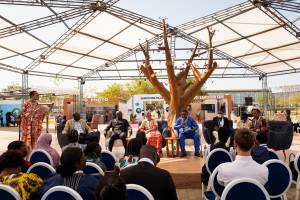
WWF’s ‘Sanitation Village’
The ‘Sanitation Village’ is a brain-child of Speak Up Africa, the Dakar-based action tank on a mission to catalyze leadership, drive policy change, and build awareness around sustainable development issues in Africa. WWF9 introduced the Sanitation Village concept to highlight the challenge of sanitation, on the one hand, and the institutional, technological, scientific and cultural responses to sanitation challenges, on the other hand.
Fashioned like a typical African village square with a Baobab tree at its core, the village was a rallying point for discussions around the key themes of the sanitation value chain. It allowed African sanitation experts the platform to discuss sanitation innovations specific to the African context through varied panel discussions, exhibitions and various thematic sessions.
“For the first time in history, sanitation has a dedicated space to strengthen advocacy and actions for the implementation of tangible responses to accelerate universal access to safely managed sanitation,” said Yacine Djibo, founder cum executive director of Speak Up Africa. “The Sanitation village allowed us to highlight how Africa plans to achieve universal access to sanitation services,” Djibo told African Newspage.
The village’s grounds saw the signing of a MoU between the Government of Senegal and the Gates Foundation on the Fecal Sludge Management (FSM) challenge, aimed at the creation of a large scale, sustainable sanitation value chain including mechanized fecal sludge management and the launch of Speak Up Africa’s Golden Sludge campaign, designed to increase awareness, prioritization, and political commitment towards equitable and inclusive sanitation policies.
“Sanitation is a matter of dignity, opportunity, and security, but above all, a basic human right that we should not have to fight for. We call on governments to put in place inclusive sanitation policies that consider issues of equity, governance, regulation and financing. We also urge governments, private sector, civil society organizations and other partners to work together to support access to quality, equitable and sustainable sanitation services for all,” said Djibo.
The stark reality of poor sanitation in Africa constitutes a major obstacle to the achievement of the SDGs, specifically target 6.2, which aims to ensure access to adequate and equitable hygiene and sanitation for all and to end OD by 2030, with particular attention to the specific needs of women and girls and those living in vulnerable situations.
Ahead of the 10th World Water Forum in 2024 to be hosted in Bali, Indonesia, Djibo looks forward to sanitation remaining prominent on the global and African agenda. She believes the idea of the ‘Sanitation Village’ or its equivalent will remain a key component of subsequent water forums’ agenda. “To achieve our common sustainable development goals, our approach to the water sector must systematically integrate sanitation.”
Abdullahi Tsanni was one of 5 select African journalists who covered the 9th World Water Forum 2022 in Dakar, Senegal, courtesy of Speak Up Africa as part of its Lines of Impact project, which seeks to strengthen journalists’ capabilities to generate impactful media coverage on public health issues.

